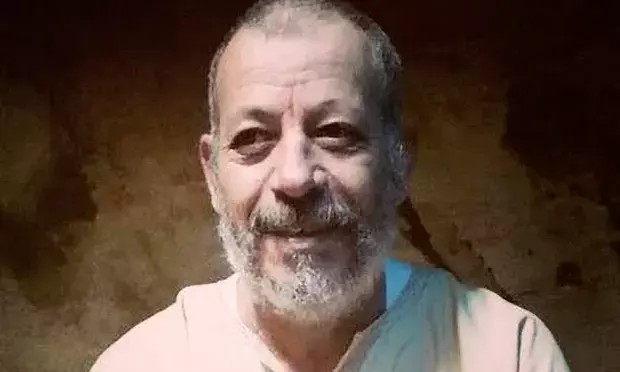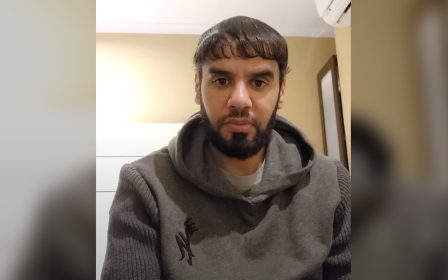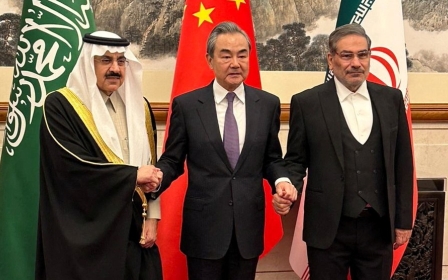Saudi Arabia executed Jordanian man day after UK minister raised concerns

Saudi Arabia executed a Jordanian man, who said he was tortured into signing a false confession, a day after the UK's Middle East minister raised his case with Saudi ministers, the Foreign Office has said.
Lord Ahmad discussed Hussein Abo al-Kheir, who was convicted in 2015 on drug charges but had long maintained his innocence, with Saudi ministers on Saturday.
It was the final effort of what MEE understands to have been multiple interventions by the minister on al-Kheir's behalf.
On Sunday, al-Kheir was executed. The 57-year-old father of eight was not given an opportunity to call his family to say goodbye.
Jeed Basyouni, who leads the work in Middle East and North Africa for Reprieve, which represented and campaigned for al-Kheir, said the intervention on Saturday was "too little, too late".
New MEE newsletter: Jerusalem Dispatch
Sign up to get the latest insights and analysis on Israel-Palestine, alongside Turkey Unpacked and other MEE newsletters
"Private representations at ministerial level are never likely to stay the executioner's hand," Basyouni told MEE.
"When the Foreign Secretary or Prime Minister publicly calls for an execution to be stopped, as they did in 2015 in the cases of Ali al-Nimr, Abdullah al-Zaher and Dawoud al-Marhoun, the Saudi government is far more likely to listen."
Her comments echoed those of MPs who have criticised UK Foreign Secretary James Cleverly for failing to make public statements about the case.
Duaa Dhainy, a researcher with European-Saudi Organisation for Human Rights (ESOHR), which has also represented al-Kheir, said the execution signalled how comfortable the kingdom is with ignoring allied governments and the UN, which had also intervened.
"His name was mentioned many, many times, but they just ignored this," Dhainy told MEE. "Now the main thing, to get his family the least possible justice, is to get his body back."
Saudi Arabia increases executions
The annual rate of executions in the kingdom has nearly doubled since King Salman and Mohammed bin Salman came to power in 2015, with the six "bloodiest years" in Saudi Arabia's recent history occurring under their leadership, according to an ESOHR and Reprieve report released earlier this year.
A disproportionate number of those executed between 2010 and 2021 were foreign nationals, the report found, many for drug-related offences which do not reach the "most serious crimes" threshold under international law.
In January 2021, the Saudi Human Rights Commission said in a statement released on its English-language Twitter account that a moratorium on drug offence executions had been imposed.
But in November 2022, 20 people, including 12 foreign nationals, were executed for drug offences during a two-week period. It was at this time that al-Kheir's case drew the attention of the UN and British politicians who called for his execution to be halted.
Foreign Minister David Rutley told MPs at that time that al-Kheir had "clearly" been tortured, that his situation was "abhorrent" and that the issue was raised "at the highest level". But later he asked for the record of his comments to be struck, saying he had spoken in error.
Rutley drew criticism from MPs who called on the government for an explanation for his backtracking and raised concerns that his was not a ministerial record correction, but rather an attempt to keep the kingdom onside.
Some of the same MPs have been critical of the government in the wake of al-Kheir's execution.
Conservative MP David Davis said: "The UK government knew Hussein Abo al-Kheir was at imminent risk but the foreign secretary failed to publicly call for his execution to be halted, despite his predecessors taking this kind of action in the past."
Liberal Democrat MP Alistair Carmichael told MEE: “The half-hearted efforts of the Foreign Office on this matter have been disappointing. We need to be full-throated in our defence of universal human rights.”
Labour MP Hilary Benn said it was "very distressing" that ministers' efforts had not saved al-Kheir's life and noted that previous interventions by UK foreign secretaries had been effective in halting executions in Saudi Arabia.
Both he and Davis mentioned the case of Abdullah al-Huwaiti, who was arrested when he was 14 and reportedly tortured into making a false confession before he was sentenced to death in 2019 and again this year. "The UK government must call on the Saudi authorities to lift the death sentence on Abdullah and release him or he could be next," Benn said.
Julia Legner, executive director with the UK-based Alqst, said that Saudi authorities are "testing the waters and seeing what can they get away with," as happened when the kingdom executed 81 people in one day last March,
"The UK has considerable diplomatic leverage with which to press the Saudi authorities, and must be prepared to use it and show there are tangible consequences for such blatant disregard of life," she said.
Middle East Eye delivers independent and unrivalled coverage and analysis of the Middle East, North Africa and beyond. To learn more about republishing this content and the associated fees, please fill out this form. More about MEE can be found here.





